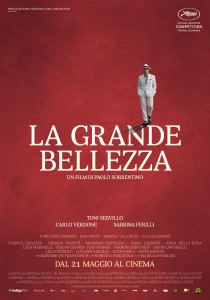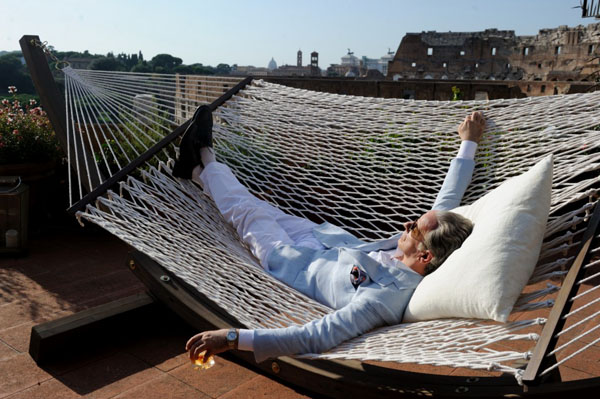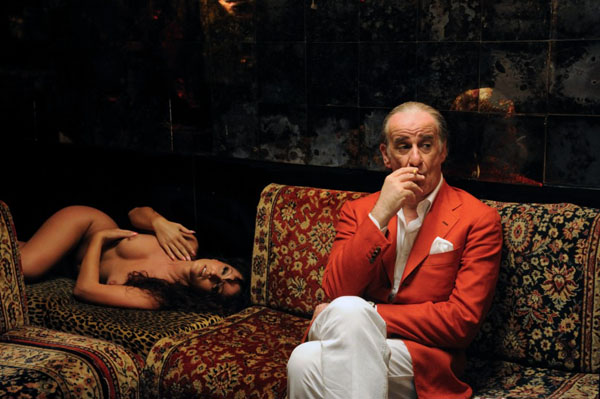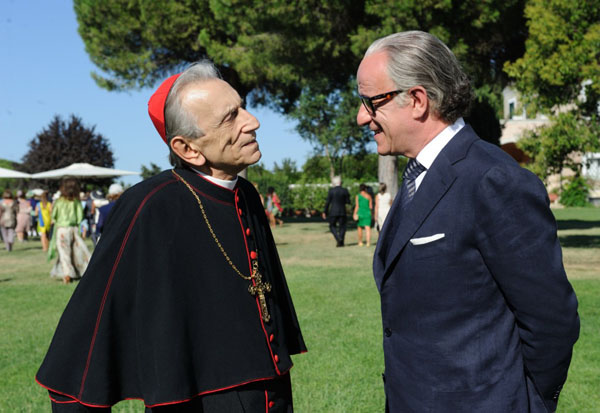 'Flaubert's biggest ambition was to write a novel about nothing,' says Jep Gambardella, protagonist of Italian film The Great Beauty, a journalist by day and womanizer by night who found fame and money many years ago from writing just one short novel. One questions whether indeed director Paolo Sorrentino might well have achieved Flaubert's ambition in film form with The Great Beauty. It is a fast-paced feature length vicarious film about…nothing. But not in a bad way.At Jep's sixty-fifth birthday party, a fantastically lively sequence capturing the raucous debauchery of the upper class residents of Rome ends with Jep's confession that his lavish lifestyle has provided him with little comfort. The rest of the film continues with sequences of flashy opulence intertwined with stunning shots of Rome, as Jep tries to understand his increasing disillusion with the high life and why he feels so hollow despite the beauty that surrounds him.There is no plot, per se, but then there is no real plot to life. And in many ways The Great Beauty is a startlingly accurate portrayal of life itself, whilst critiquing the excesses of Italy's ruling classes under the guise of following an ageing lothario having a minor existential crisis. Walking with a soon-to-be notch on the bedpost, Jep enquires as to her occupation. 'Me? I'm rich', she replies. 'Great job' smiles Jep, with equal amounts of sincerity and sarcasm.
'Flaubert's biggest ambition was to write a novel about nothing,' says Jep Gambardella, protagonist of Italian film The Great Beauty, a journalist by day and womanizer by night who found fame and money many years ago from writing just one short novel. One questions whether indeed director Paolo Sorrentino might well have achieved Flaubert's ambition in film form with The Great Beauty. It is a fast-paced feature length vicarious film about…nothing. But not in a bad way.At Jep's sixty-fifth birthday party, a fantastically lively sequence capturing the raucous debauchery of the upper class residents of Rome ends with Jep's confession that his lavish lifestyle has provided him with little comfort. The rest of the film continues with sequences of flashy opulence intertwined with stunning shots of Rome, as Jep tries to understand his increasing disillusion with the high life and why he feels so hollow despite the beauty that surrounds him.There is no plot, per se, but then there is no real plot to life. And in many ways The Great Beauty is a startlingly accurate portrayal of life itself, whilst critiquing the excesses of Italy's ruling classes under the guise of following an ageing lothario having a minor existential crisis. Walking with a soon-to-be notch on the bedpost, Jep enquires as to her occupation. 'Me? I'm rich', she replies. 'Great job' smiles Jep, with equal amounts of sincerity and sarcasm.
 Image: ©Gianni Florito via studiopuntoevirgola.com
Image: ©Gianni Florito via studiopuntoevirgola.comLabeled a direct successor to Fellini's La Dolce Vita, all are citing this as Sorrentino's best work yet. Toni Servillo does Jep Gambardella justice with a mixture of smug cynicism combined with a slight neediness. Equally high praise should go to Sabrina Ferilli, playing the stripper Ramona, who justly received a nastro d'Argento (silver ribbon) for best supporting actress. Ramona provides Jep with a new perspective thanks to her world-weary sensitivity.Although difficult to criticize, at two hours and twenty-two minutes long The Great Beauty does rely heavily on breathtaking cinematography, as opposed to a captivating narrative, to hold our attention. It could be argued that anyone can impress when filming scantily clad women and one of the world's most beautiful cities on a high budget, but cinematographer Luca Bigazzi picked up an Italian Golden Globe for his efforts and visually the film is a feast for the eyes. The camera simultaneously captures everything, but tells nothing. Long dazzling sequences, which put Baz Luhrmann's evocation of Gatsby's sumptuous surroundings to shame, are often superfluous narrative-wise; yet underline how futility is overcome with sensory indulgence.
 Image: ©Gianni Florito via studiopuntoevirgola.com
Image: ©Gianni Florito via studiopuntoevirgola.comThe unsteadiness of the meandering camera reflects the heady atmosphere in which the rich bathe, as if it too is perpetually drunk. The soundtrack also contrasts sensuality and seediness. Alternating such highbrow composers as Bizet with numerous trashy European dance floor hits, false pretences are sardonically exposed.Sorrentino's script is witty and well crafted. When satirising the pretensions of the self labeled intelligentsia, one always runs the risk of coming out as equally pretentious, but there is enough jibing and mockery between Jep and his rich "friends" that The Great Beauty manages to carry some intellectual weight whilst still mocking the faux-intellectual spiel of those high on their own incomes.Unsurprisingly, the Roman Catholic Church does not escape Sorrentino's critical glare. Despite being tipped to be the next pope, Cardinal Bellucci (Roberto Herlitzka) turns out to have nothing more to say than reeling off endless cooking tips, much to the delight of a bunch of trophy wives who lap up his every word.
 Image: ©Gianni Florito via studiopuntoevirgola.com
Image: ©Gianni Florito via studiopuntoevirgola.comSomewhat self indulgent, The Great Beauty cannot possibly entirely avoid being a victim of its own satire, being a film we cannot help judging more on its beauty than its philosophical strength. You can attempt to out do those around you, but that wont cover up the essential void over which all life is formed, just as the amalgamation of lavish sequences doesn't enlighten us in any way and we are still waiting for Godot at the end.The end credits role over a lazy backdrop of the River Tiber as the camera glides along it. This final travelling shot serves as a powerful reminder, not the least because the camera floating on the water is a direct contrast to the shot of the sunken Concordia, an unsubtle representation of sunken morals. Sorrentino may have just filmed 'nothing', but as we move with the camera along the river we are reminded that the only way to endure the emptiness is to keep on travelling. Life can be beautiful along the way, as long as we avoid sinking under illusions of grandeur.
Imogen Robinson is an Editor at Just A Platform, an international cultural platform.
www.justaplatform.com
Imogen Robinson United Kingdom
 'Flaubert's biggest ambition was to write a novel about nothing,' says Jep Gambardella, protagonist of Italian film The Great Beauty, a journalist by day and womanizer by night who found fame and money many years ago from writing just one short novel. One questions whether indeed director Paolo Sorrentino might well have achieved Flaubert's ambition in film form with The Great Beauty. It is a fast-paced feature length vicarious film about…nothing. But not in a bad way.At Jep's sixty-fifth birthday party, a fantastically lively sequence capturing the raucous debauchery of the upper class residents of Rome ends with Jep's confession that his lavish lifestyle has provided him with little comfort. The rest of the film continues with sequences of flashy opulence intertwined with stunning shots of Rome, as Jep tries to understand his increasing disillusion with the high life and why he feels so hollow despite the beauty that surrounds him.There is no plot, per se, but then there is no real plot to life. And in many ways The Great Beauty is a startlingly accurate portrayal of life itself, whilst critiquing the excesses of Italy's ruling classes under the guise of following an ageing lothario having a minor existential crisis. Walking with a soon-to-be notch on the bedpost, Jep enquires as to her occupation. 'Me? I'm rich', she replies. 'Great job' smiles Jep, with equal amounts of sincerity and sarcasm.
'Flaubert's biggest ambition was to write a novel about nothing,' says Jep Gambardella, protagonist of Italian film The Great Beauty, a journalist by day and womanizer by night who found fame and money many years ago from writing just one short novel. One questions whether indeed director Paolo Sorrentino might well have achieved Flaubert's ambition in film form with The Great Beauty. It is a fast-paced feature length vicarious film about…nothing. But not in a bad way.At Jep's sixty-fifth birthday party, a fantastically lively sequence capturing the raucous debauchery of the upper class residents of Rome ends with Jep's confession that his lavish lifestyle has provided him with little comfort. The rest of the film continues with sequences of flashy opulence intertwined with stunning shots of Rome, as Jep tries to understand his increasing disillusion with the high life and why he feels so hollow despite the beauty that surrounds him.There is no plot, per se, but then there is no real plot to life. And in many ways The Great Beauty is a startlingly accurate portrayal of life itself, whilst critiquing the excesses of Italy's ruling classes under the guise of following an ageing lothario having a minor existential crisis. Walking with a soon-to-be notch on the bedpost, Jep enquires as to her occupation. 'Me? I'm rich', she replies. 'Great job' smiles Jep, with equal amounts of sincerity and sarcasm. Image: ©Gianni Florito via studiopuntoevirgola.com
Image: ©Gianni Florito via studiopuntoevirgola.com Image: ©Gianni Florito via studiopuntoevirgola.com
Image: ©Gianni Florito via studiopuntoevirgola.com Image: ©Gianni Florito via studiopuntoevirgola.com
Image: ©Gianni Florito via studiopuntoevirgola.com





